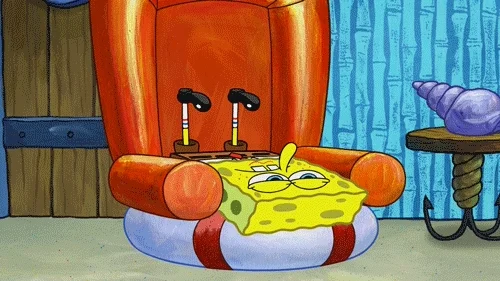Do you know a teenager who appears to be unmotivated at school? Are their grades starting to slip? Is that teen melting away, disengaged, and looking like:

There may be things going on that are distracting them or draining their energy. Diving into the teen's perspective can help you understand what they're going through. With the right mindset, you can support and help them get out of their slump.
Take these three steps to motivate that teen to shine at school!
#1: Understand their point of view
Why might teens lose their motivation to do well in school? According to WebMD, the teenage years are one of the most important periods for brain growth as teenagers learn to think more critically and make more complex decisions.
There is more demand on the brain, and teens can be overwhelmed to the point where they lose their motivation andslow down. One of the best things to do to support them is to let the teen share their thoughts and feelings.

Why do you need to understand a teen's point of view?
Listening shows that you care about their well-being and will help them in the way they want to be supported.
You can learn what might be causing the demotivation, such as problems with friends, a new environment, or a situation they're experiencing.
It's easy to forget that teens are going through a lot of change, so putting yourself in their shoes can help you understand their stress.
How to motivate a teenager through understanding:
Listen carefully to what they have to say. Don't interrupt them.
You can also learn about their interests and use them as a motivator.
Ask: "Do you need advice, want support, or just want me to listen?" Based on their response, you can provide the support they need.
Speak positively towards the teen. Thank them for opening up, and share how much you appreciate them trusting you with their concerns. This builds a positive relationship that will help you implement action plans later on.
Listening is key to providing the support they need. If you notice something is draining their motivation, you can help them address that issue. If they need something to push them forward, you can gather the resources to make it happen.
Motivation looks different for everyone, so paying attention to their need will help you find a way to get that teen back on track.
#2: Establish positive relationships in a community of support
Teens might not put in their best effort if they feel unsupported when things go wrong, which can dampen their motivation to challenge themselves.
Positive relationships based on respect and trust will help motivate that teen, whether they are with family, friends, or people at school. Everyone is involved in a teen's growth: parents, family members, friends, teachers, and counselors, to name a few.

Why do you need to build a community of support?
Teens will feel cared for and seen during difficult times, which will encourage them to keep going.
Teens can reach out to different people depending on their needs.
Community builds meaningful connections, reminding teens that they're not alone — especially when their community shows appreciation and acceptance for who they are.
How to motivate a teenager through community:
Encourage teens to communicate with their teachers and counselors. If they're struggling in class or need to talk to someone, let them know they have resources at school.
Give them autonomy. Teens want to be respected and treated as young adults. Giving them space shows you trust them, which will strengthen your relationship with them.
Quiz: Ms. Parker's Dilemma

Ms. Parker is a teaching assistant in a chemistry classroom. Recently, she noticed that one of the students, Mitch, has been struggling. This is unusual since he typically did well in this class.
After sitting him down and listening to what he had to say, she learned that Mitch was feeling unmotivated because he was no longer interested in chemistry and wanted to focus on drawing and art.
What should Ms. Parker's next steps be? Select all that apply:
A. Encourage Mitch to talk to his counselor so that he can find out why his interests changed and discover a way to get back into chemistry.
B. Encourage Mitch to blend art into chemistry, such as illustrating concepts and examples in his notes.
C. Encourage Mitch to talk to his teacher so that they know what is going on and can help him improve his grade.
D. Trust that Mitch knows what he's doing and give him space to focus on his art.
Quiz
What should Ms. Parker's next steps be? Select all that apply:
#3: Create a goal
Help the teen create a SMART goal to get back on track. A SMART goal is specific, measurable, action-oriented, realistic,and time-sensitive. It can motivate a teen by helping them carefully plan their next steps.
Why should a teen create a SMART goal?
It can help the teen focus on a task and take action steps towards it.
A detailed plan will make the goal more achievable and keep the teen accountable.
Because it is time-sensitive, the teen can track their progress based on how close they are to reaching their goal, which will motivate them to keep going.
How to motivate a teen with a SMART goal:
Give them the resources and support to achieve that goal.
Check in regularly to see what progress they are making and what you can do to support them.
Encourage them to keep going when they are struggling! Remind them why they are doing this and praise them for how far they've come.

Example of a SMART goal:
"I will earn a 3.6 GPA by the end of the school year."
Specific: The goal is to earn a 3.6 GPA by the end of the school year.
Measurable: You can track your progress by checking your report card.
Action-oriented: You can earn a 3.6 by earning an A in all of your classes.
Realistic: You can achieve this goal if you do well in your classes. If you had a 3.0 GPA last year, you can achieve a 3.6 GPA this year.
Time-sensitive: This goal needs to be met by the end of the school year, so you have time to work towards it.
Take Action
Teens are at an important time in their development where they need to work through a lot of change and become more independent, which can affect their motivation at school.
It's important to focus on their needs. By understanding where they're coming from, you can help the teen move forward. With the right guidance and a clear action plan, teens will find their motivation to get back on track and succeed in school.

Get that teen motivated to succeed in school:
Your feedback matters to us.
This Byte helped me better understand the topic.


